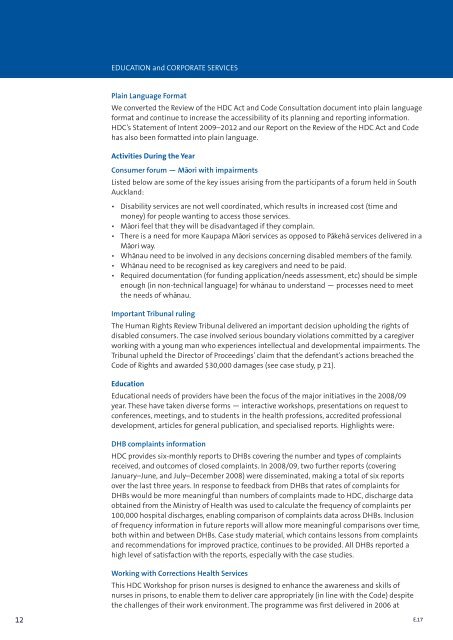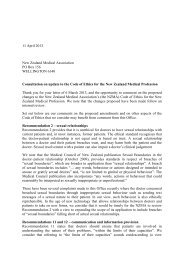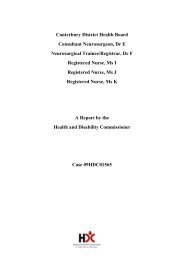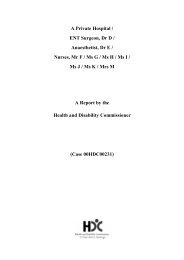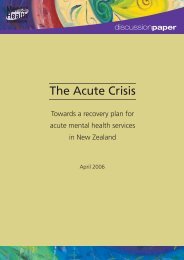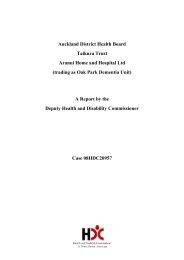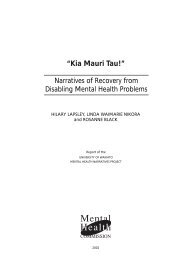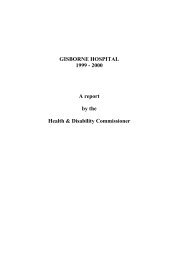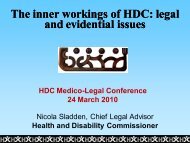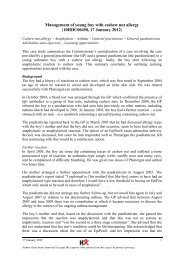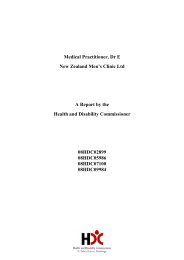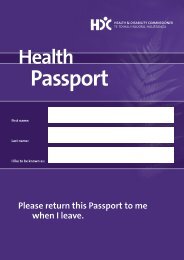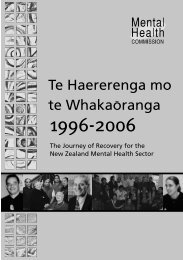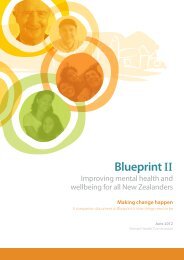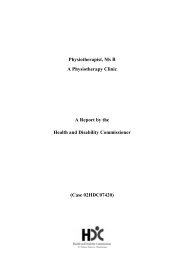Annual Report for the year ended 30 June 2009 - Health and ...
Annual Report for the year ended 30 June 2009 - Health and ...
Annual Report for the year ended 30 June 2009 - Health and ...
You also want an ePaper? Increase the reach of your titles
YUMPU automatically turns print PDFs into web optimized ePapers that Google loves.
REPORT EDUCATION OF THE <strong>and</strong> DEPUTY CORPORATE COMMISSIONER SERVICES — EDUCATION <strong>and</strong> CORPORATE SERVICES<br />
Plain Language Format<br />
We converted <strong>the</strong> Review of <strong>the</strong> HDC Act <strong>and</strong> Code Consultation document into plain language<br />
<strong>for</strong>mat <strong>and</strong> continue to increase <strong>the</strong> accessibility of its planning <strong>and</strong> reporting in<strong>for</strong>mation.<br />
HDC’s Statement of Intent <strong>2009</strong>–2012 <strong>and</strong> our <strong>Report</strong> on <strong>the</strong> Review of <strong>the</strong> HDC Act <strong>and</strong> Code<br />
has also been <strong>for</strong>matted into plain language.<br />
Activities During <strong>the</strong> Year<br />
Consumer <strong>for</strong>um — Māori with impairments<br />
Listed below are some of <strong>the</strong> key issues arising from <strong>the</strong> participants of a <strong>for</strong>um held in South<br />
Auckl<strong>and</strong>:<br />
• Disability services are not well coordinated, which results in increased cost (time <strong>and</strong><br />
money) <strong>for</strong> people wanting to access those services.<br />
• Māori feel that <strong>the</strong>y will be disadvantaged if <strong>the</strong>y complain.<br />
• There is a need <strong>for</strong> more Kaupapa Māori services as opposed to Pākehā services delivered in a<br />
Māori way.<br />
• Whānau need to be involved in any decisions concerning disabled members of <strong>the</strong> family.<br />
• Whānau need to be recognised as key caregivers <strong>and</strong> need to be paid.<br />
• Required documentation (<strong>for</strong> funding application/needs assessment, etc) should be simple<br />
enough (in non-technical language) <strong>for</strong> whānau to underst<strong>and</strong> — processes need to meet<br />
<strong>the</strong> needs of whānau.<br />
Important Tribunal ruling<br />
The Human Rights Review Tribunal delivered an important decision upholding <strong>the</strong> rights of<br />
disabled consumers. The case involved serious boundary violations committed by a caregiver<br />
working with a young man who experiences intellectual <strong>and</strong> developmental impairments. The<br />
Tribunal upheld <strong>the</strong> Director of Proceedings’ claim that <strong>the</strong> defendant’s actions breached <strong>the</strong><br />
Code of Rights <strong>and</strong> awarded $<strong>30</strong>,000 damages (see case study, p 21).<br />
Education<br />
Educational needs of providers have been <strong>the</strong> focus of <strong>the</strong> major initiatives in <strong>the</strong> 2008/09<br />
<strong>year</strong>. These have taken diverse <strong>for</strong>ms — interactive workshops, presentations on request to<br />
conferences, meetings, <strong>and</strong> to students in <strong>the</strong> health professions, accredited professional<br />
development, articles <strong>for</strong> general publication, <strong>and</strong> specialised reports. Highlights were:<br />
DHB complaints in<strong>for</strong>mation<br />
HDC provides six-monthly reports to DHBs covering <strong>the</strong> number <strong>and</strong> types of complaints<br />
received, <strong>and</strong> outcomes of closed complaints. In 2008/09, two fur<strong>the</strong>r reports (covering<br />
January–<strong>June</strong>, <strong>and</strong> July–December 2008) were disseminated, making a total of six reports<br />
over <strong>the</strong> last three <strong>year</strong>s. In response to feedback from DHBs that rates of complaints <strong>for</strong><br />
DHBs would be more meaningful than numbers of complaints made to HDC, discharge data<br />
obtained from <strong>the</strong> Ministry of <strong>Health</strong> was used to calculate <strong>the</strong> frequency of complaints per<br />
100,000 hospital discharges, enabling comparison of complaints data across DHBs. Inclusion<br />
of frequency in<strong>for</strong>mation in future reports will allow more meaningful comparisons over time,<br />
both within <strong>and</strong> between DHBs. Case study material, which contains lessons from complaints<br />
<strong>and</strong> recommendations <strong>for</strong> improved practice, continues to be provided. All DHBs reported a<br />
high level of satisfaction with <strong>the</strong> reports, especially with <strong>the</strong> case studies.<br />
Working with Corrections <strong>Health</strong> Services<br />
This HDC Workshop <strong>for</strong> prison nurses is designed to enhance <strong>the</strong> awareness <strong>and</strong> skills of<br />
nurses in prisons, to enable <strong>the</strong>m to deliver care appropriately (in line with <strong>the</strong> Code) despite<br />
<strong>the</strong> challenges of <strong>the</strong>ir work environment. The programme was first delivered in 2006 at<br />
12 E.17


